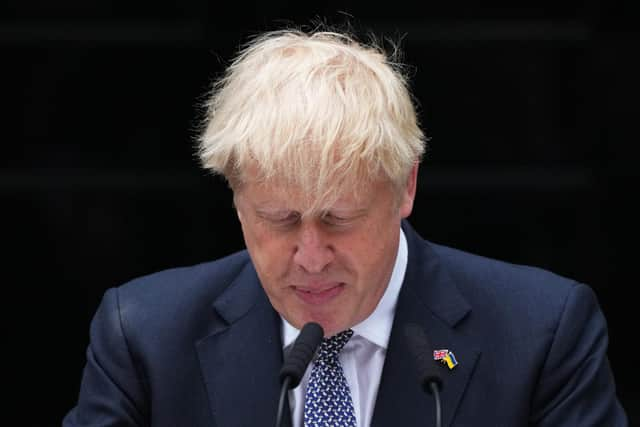If the West applauded Boris Johnson over Ukraine, Moscow laughed at his jingoism - Patrick Mercer
The humiliating defeats their forces suffered as a result surprised no one: what is a surprise, though, is that President Zelensky now seems to be about to make the same mistake. Or is he?
For the past three months Russia has been using the bulk of her slender forces in Ukraine to try to capture the Donbas and – in their view – liberate the pro-Russian peoples there.
Advertisement
Hide AdAdvertisement
Hide AdIn military parlance, it has been their ‘Main Effort’, consuming the lion’s share of materiel and manpower whilst killing, wounding and capturing large numbers of Ukrainians.


It’s taken time and resources and been successful in a limited way, but there’s still a great chunk of heavily defended land to fall before the whole of the Donbas is under Moscow’s control.
Now, this fighting will grumble on and whilst it does Russian forces will be degraded, lines of communication stretched and the Kremlin’s eye kept firmly fixed on one area – and it’s upon that very fixation that Kiev intends to capitalise.
How?
Well, far away from the Donbas, close to the mouth of the vital Dneiper river, lies Russian-held Kherson and in the last few days Zelensky’s team has warned the civilian population to get out as soon as possible because a great counter-offensive is about to start there.
Advertisement
Hide AdAdvertisement
Hide AdA new army of several hundred thousand armed with Western weapons will drive the invaders from the valuable industrial and port studded belt – perhaps even as far as the ideologically and economically vital Crimea.
Whilst Kiev may have used some creative accountancy over the number of fresh troops, there’s no doubt that new, longer range weapons are striking deep into Russian territory and that, despite 80 per cent of Kiev’s pre-war forces now having been destroyed, Ukrainian morale remains surprisingly high.
I’m sure that President Zelensky also knows that there’s not much time left before the weather turns and if, as he’s suggested, there’s hope that the war will be ‘won’ or in a state of intractable stalemate by the end of this year, he needs tangible successes to strengthen his hand.
But will he attack when and where he says he’s going to? I very much doubt it: I reckon he’s telling a strategic pork pie – and so he should.
Advertisement
Hide AdAdvertisement
Hide AdBut the Russians will have another view revolving, I suspect, around the G20 in Bali in mid-November. President Putin has already said that he intends to make a major speech there and it’s worth a punt on what’s going through his mind.
He’ll hope that the Special Military Operation will be approaching completion by then with Moscow’s trademark ‘hybrid warfare’ yielding results as winter deepens.
By autumn the Kremlin will expect that a quarter of Ukraine will have been captured and most of its ports sealed – which handle 70 per cent of its overall exports and 98 per cent of its grain exports. As famine beckons in Africa and elsewhere, President Putin might play peacemaker by easing the blockades and allowing the wheat to flow to the world’s hungry.
In parallel, the Kremlin will bank on EU/Nato unity being on the point of collapse as squabbles over energy supplies turn vicious.
Advertisement
Hide AdAdvertisement
Hide AdWe’re already seeing German hysteria over the temporary turning off of the Nordstream pipeline – and that’s in the middle of summer.
Now the Kremlin will pore over this panic and be very confident that shrinking fuel stocks will cause political upheaval as temperatures plunge – not just in Berlin, but in Paris and Rome, too.
One of Russia’s strategic aims was the fracturing of Nato and although this seemed to have been dashed by the accession of Sweden and Finland, weaponised gas and oil supplies may do the job just as effectively as tanks, ships and missiles.
There’ll be a couple of political cards in play, too.
The Kremlin will anticipate a drubbing for President Biden in America’s mid-term elections on November 8, just in time for the Bali get-together.
Advertisement
Hide AdAdvertisement
Hide AdInflation and petrol prices will be biting hard; domestic concerns must trump foreign policy and ‘Ukraine fatigue’ can only rise as Kiev increases its pleas for expensive weapons and $5bn a month in aid.
Can Sleepy Joe stick to an increasingly tricky course or will he pull the rug as he did in Afghanistan? The other card belongs to us. Whatever plaudits Mr Johnson garnered in the West, Moscow laughed at his jingoism whilst he axed his own forces and giggled at the lounge suit he wore for walkabout in Kiev after he’d donned body armour for a trot around Liverpool.
Yet they paid attention – and now’s our chance to send someone serious to back Mr Zelensky, someone of gravitas to whom President Putin will listen without a snigger.
This war is complex and, like all other conflicts, encompasses economic, industrial and political elements.
Advertisement
Hide AdAdvertisement
Hide AdYet, ultimately, the balance rests on the battlefield and that’s exactly where Mr Zelensky, backed by the West, should focus.
His strategists must feint and deceive, dodge and decoy and if Britain can send a new Prime Minister to stiffen spines and properly summon the spirit of Churchill, so much the better.
- Patrick Mercer is former MP for Newark and ex-Army colonel. After joining the British Army in 1975, he completed nine tours in Northern Ireland and commanded his battalion in Bosnia, Canada and Tidworth. He then became a defence correspondent before going into politics.